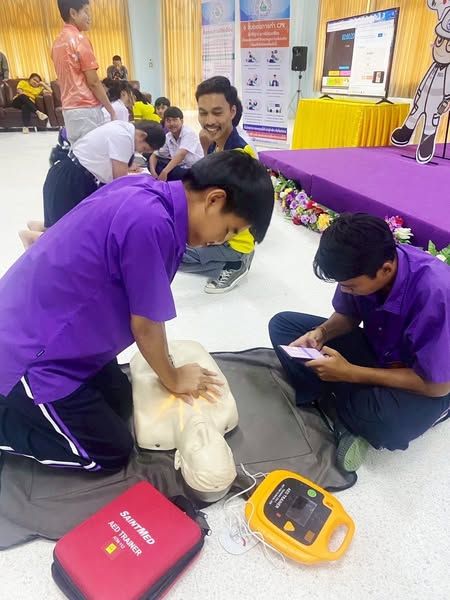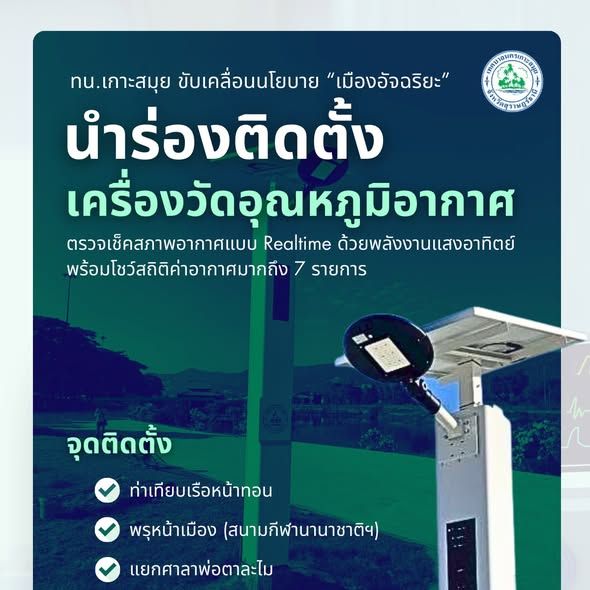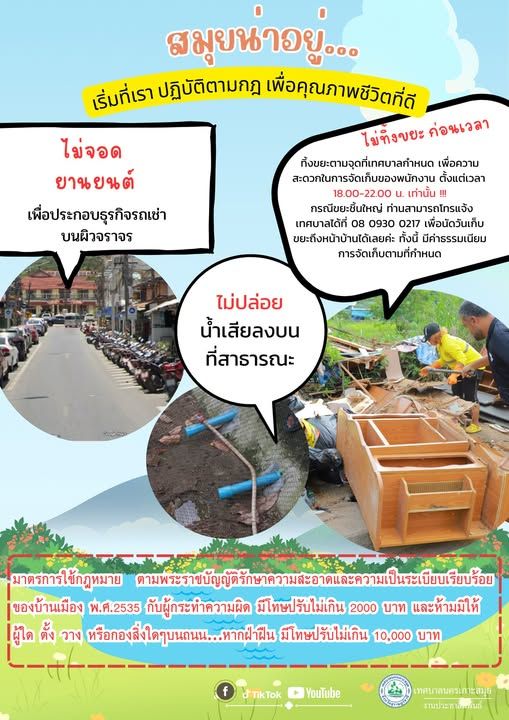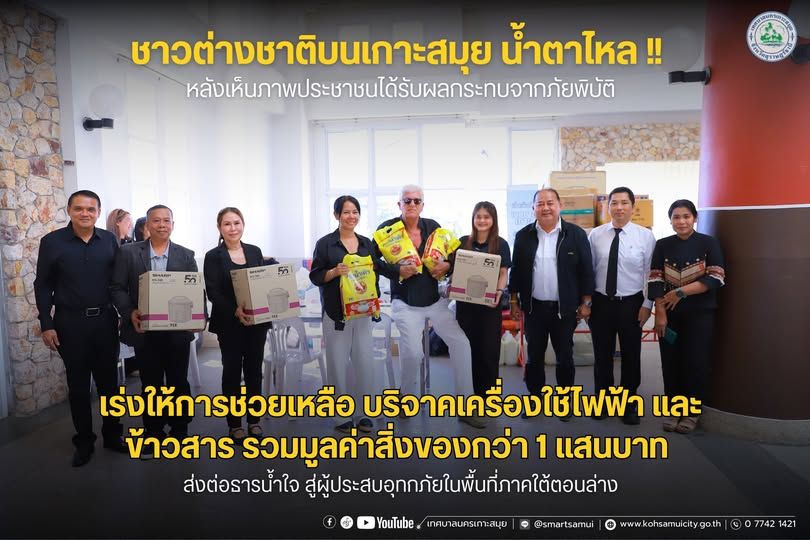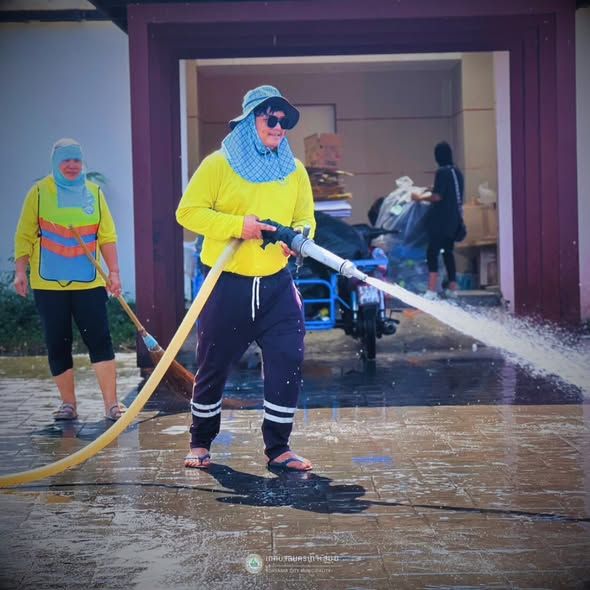Koh Samui is transforming community healthcare through an innovative Village Doctor Training Project, empowering local volunteers with critical medical skills like CPR and emergency response. Inspired by King Bhumibol Adulyadej’s royal initiative, this groundbreaking program at Koh Samui Vocational College is creating frontline health heroes who can save lives in their communities.
KohSamui #HealthcareHeroes #CommunityHealth #MedicalTraining #ThailandTravel #VolunteerWork #RoyalInitiative #EmergencyResponse #HealthEducation #SocialImpact
Background and Purpose
The Municipality of Koh Samui City has launched a Village Doctor Training Project inspired by the royal initiative of His Majesty King Bhumibol Adulyadej. The project for the fiscal year 2025 is designed to strengthen grassroots healthcare by equipping local individuals with essential medical knowledge and skills. The training program aims to nurture a cadre of “village doctors” who can provide primary health support within their communities, bridging the gap between local populations and formal healthcare systems.
Event Details
The project was officially opened on June 30, 2025, at Koh Samui Vocational College. The event began at 9:00 a.m. in the college’s meeting room, bringing together a wide range of participants. These included teachers, lecturers from Koh Samui Hospital, emergency medical response volunteers, students from Koh Samui Vocational College, students from Ban Na Khai School, and relevant municipal staff. The weeklong training, running from June 23 to 30, 2025, was organized by the Health and Environment Division, specifically the Health Promotion and Disease Prevention Section of the Koh Samui Municipality.
Training Program Components
Basic Life Support (CPR)
One of the core components of the training was basic life support, with a special focus on Cardiopulmonary Resuscitation (CPR). Participants learned about the vital steps to assist individuals experiencing cardiac arrest or respiratory failure. The training covered both theory and hands-on practice using manikins and simulation equipment, ensuring that all participants were comfortable and proficient with CPR techniques.
Automated External Defibrillator (AED) Usage
In addition to CPR, the program provided detailed instructions on the use of Automated External Defibrillators (AEDs). This practical training aimed to familiarize attendees with AED operation, which is crucial for responding effectively during cardiac emergencies. Participants practiced identifying cardiac emergencies, applying AED pads, and following device prompts to deliver life-saving shocks.
Health Promotion and Disease Prevention
The workshop also emphasized the importance of disease prevention and healthy living. Experts delivered sessions on monitoring vital signs, recognizing early symptoms of common illnesses, and adopting daily habits that promote well-being. Attendees learned about nutrition, exercise, personal hygiene, and environmental health—all essential for reducing the risk of both communicable and non-communicable diseases.
Roles and Responsibilities of Village Doctors
Village doctors, as defined by the initiative, serve as crucial links between the healthcare system and rural or semi-urban communities. Their responsibilities include:
- Educating community members about preventive healthcare and healthy lifestyles
- Providing basic first aid and emergency response
- Assisting with disease surveillance and reporting local outbreaks
- Supporting chronic disease management for residents with conditions such as diabetes or hypertension
- Coordinating with public health agencies to ensure timely referrals and follow-up care
Community Involvement and Collaboration
The project fostered collaboration among multiple stakeholders, including educational institutions, healthcare providers, municipal authorities, and local residents. Students from Ban Na Khai School and Koh Samui Vocational College gained practical skills, while healthcare professionals and emergency volunteers shared their expertise and real-world experiences. This multi-sectoral partnership is designed to create a sustainable health support network at the village level.
Broader Impact and Significance
By empowering local individuals with medical knowledge and emergency response skills, the Village Doctor Training Project aims to:
- Enhance community resilience during health emergencies
- Reduce pressure on hospitals by enabling basic care and early intervention
- Improve overall health literacy and self-care practices among residents
- Lay the groundwork for future community health initiatives and capacity-building programs
Future Prospects
The Village Doctor Training Project in Koh Samui represents a forward-thinking approach to public health, rooted in the royal vision of self-reliance and community empowerment. As the program continues to expand, it is expected to serve as a model for other municipalities looking to strengthen primary healthcare delivery at the grassroots level.
Frequently Asked Questions
FAQ: Village Doctor Training Project in Koh Samui
What is the main purpose of the Village Doctor Training Project in Koh Samui?
The primary goal of the Village Doctor Training Project is to empower local community members with essential medical skills such as CPR and emergency response. Inspired by His Majesty King Bhumibol Adulyadej’s royal initiative, the program aims to strengthen community healthcare by training “village doctors” who can provide basic health support, promote disease prevention, and act as a bridge between local communities and the formal healthcare system.
What kind of training do participants receive in the Village Doctor Training Project?
Participants undergo a comprehensive training program that includes:
– Basic Life Support and Cardiopulmonary Resuscitation (CPR): Both theoretical and hands-on practice using manikins.
– Automated External Defibrillator (AED) Usage: Practical instruction on identifying cardiac emergencies and operating AEDs.
– Health Promotion and Disease Prevention: Sessions on monitoring vital signs, recognizing symptoms of common illnesses, and adopting healthy lifestyle habits.
This holistic approach ensures that trainees are well-equipped to handle emergencies, promote wellness, and support disease management within their communities.
How does the project benefit the Koh Samui community and what is its long-term impact?
By training local volunteers as village doctors, the project:
– Enhances community resilience during emergencies by enabling immediate response and basic care.
– Reduces pressure on hospitals by providing early intervention and primary care at the village level.
– Improves health literacy and encourages healthy living through education and outreach.
– Builds a sustainable network for ongoing health support and future initiatives.
The program’s collaborative model fosters lasting partnerships among schools, healthcare institutions, and municipal authorities, serving as a future-ready blueprint for community health empowerment across Thailand.
